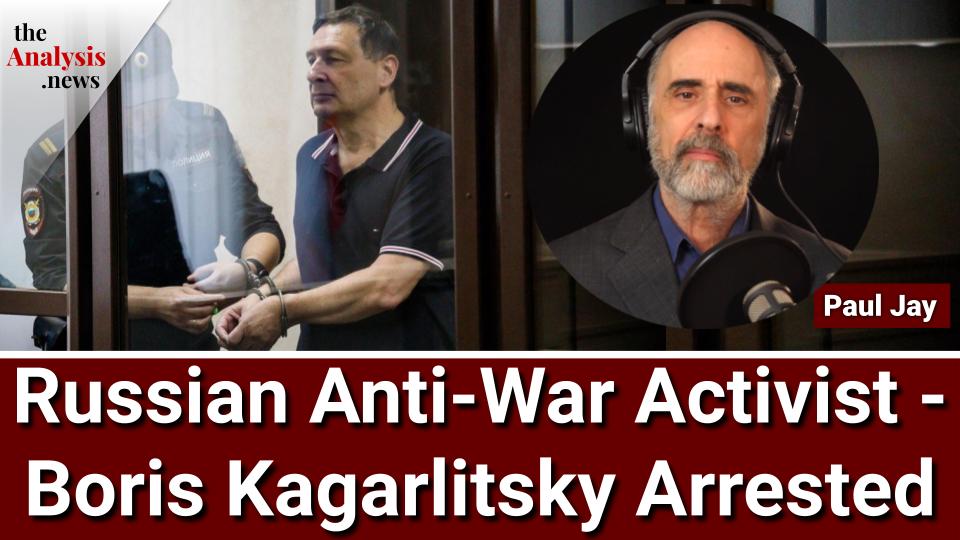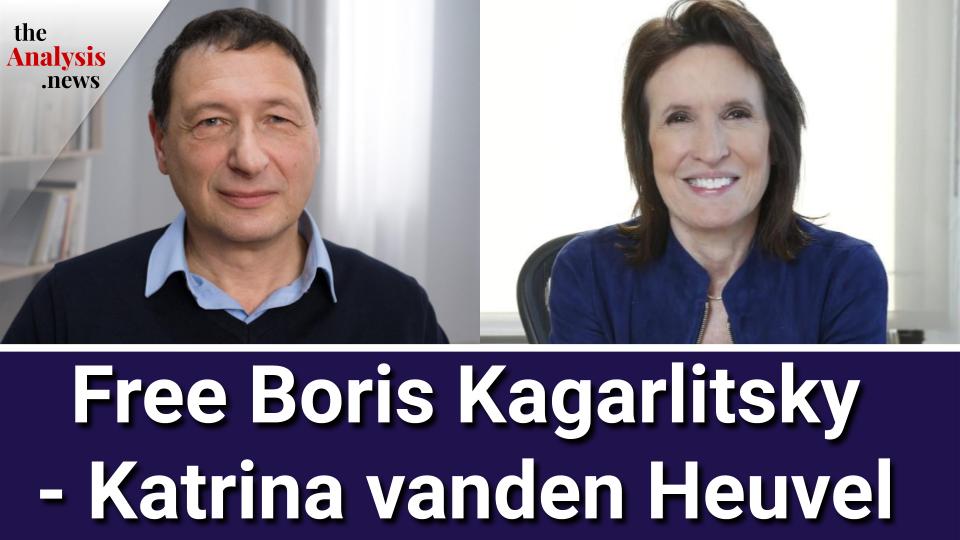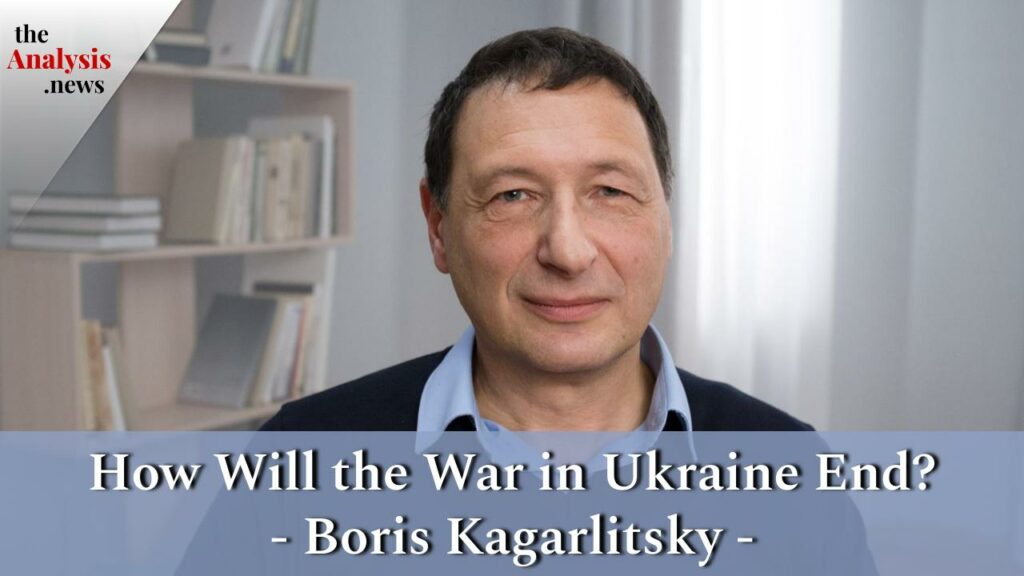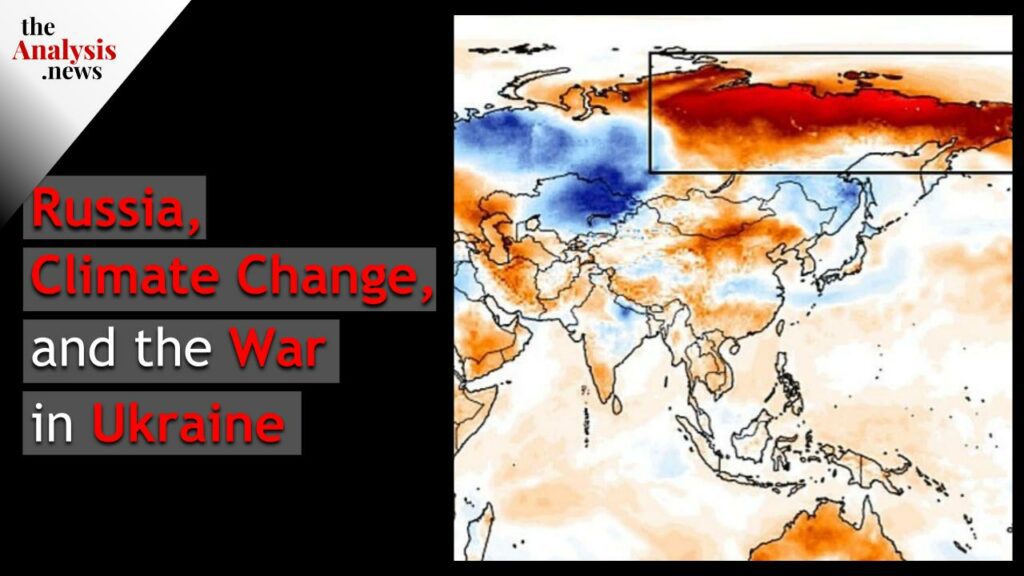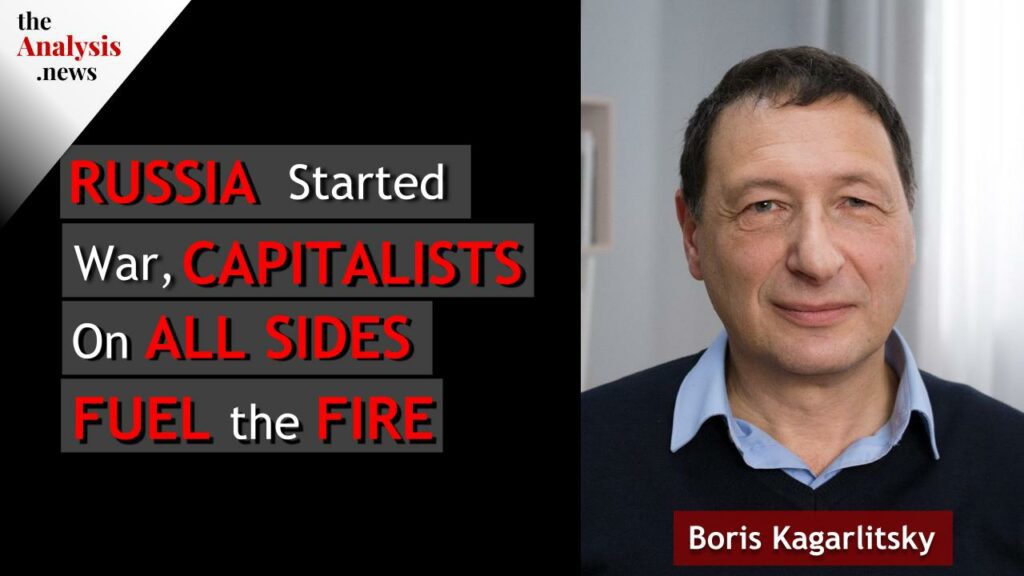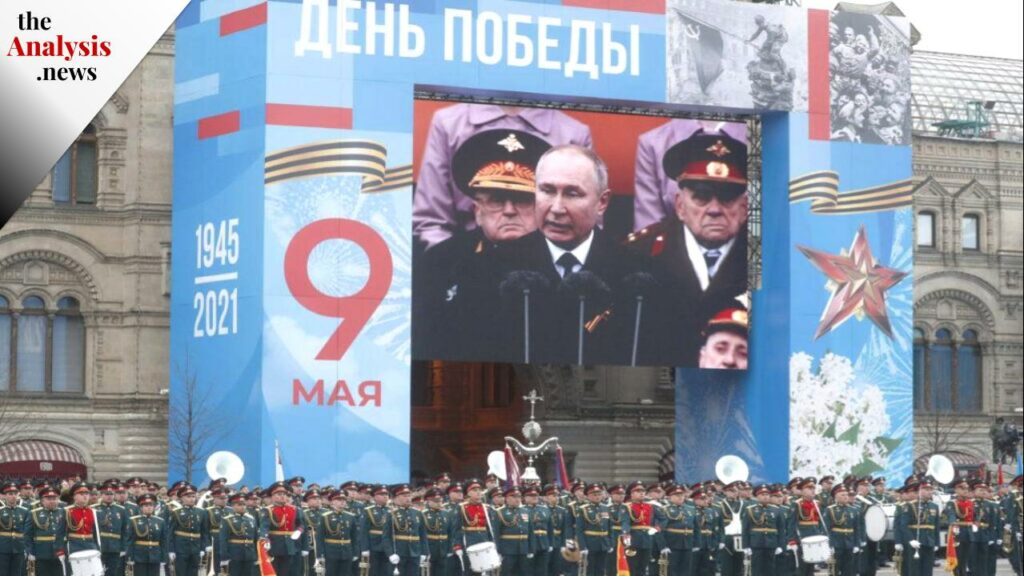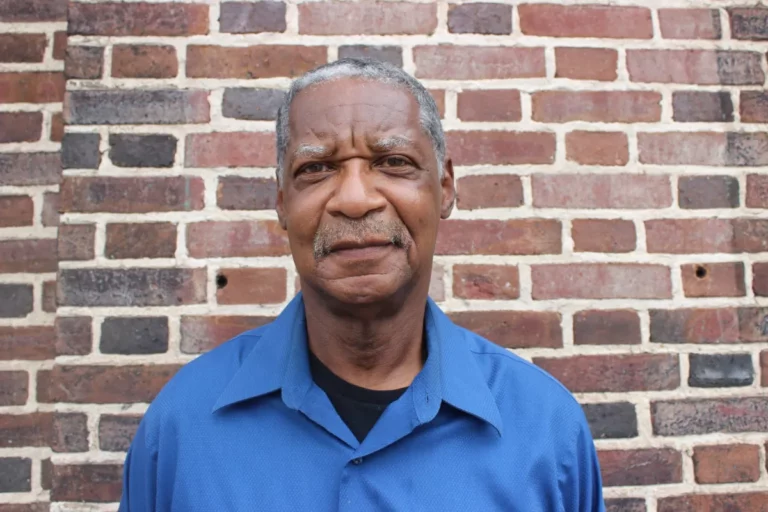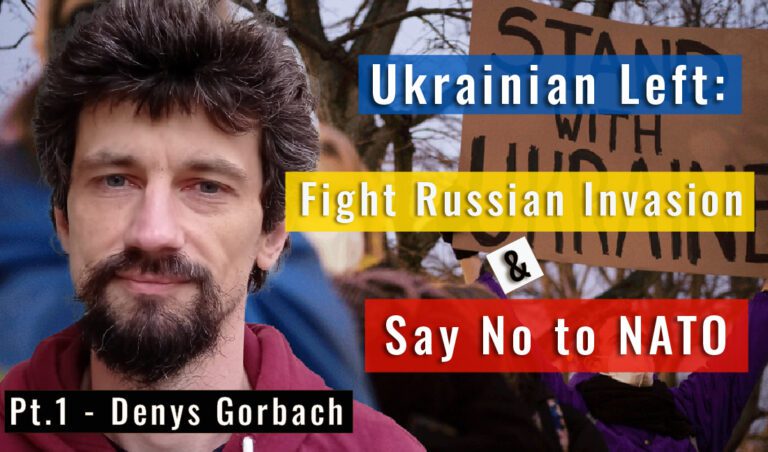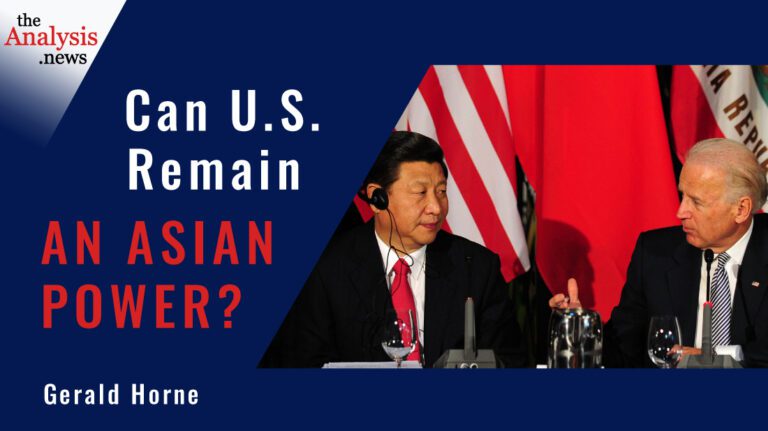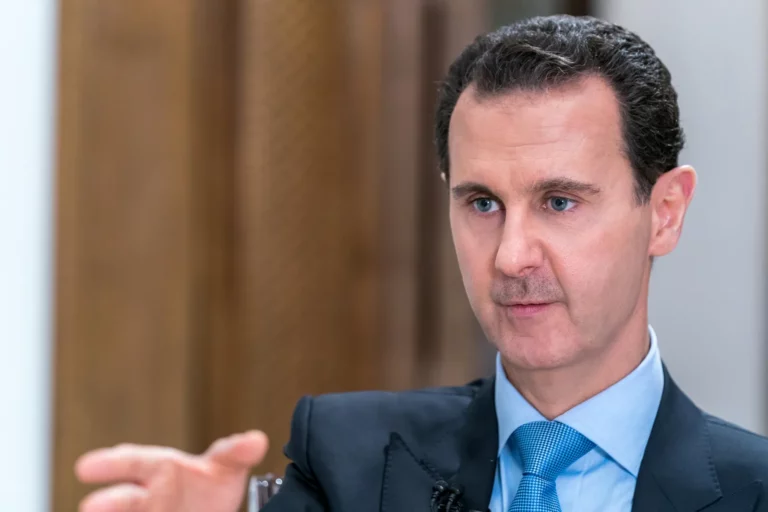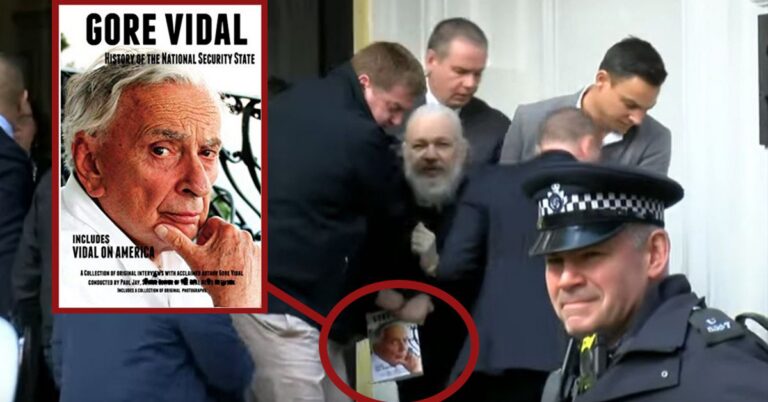Paul Jay and Talia Baroncelli discuss the recent arrest of Russian anti-war sociologist and Marxist Boris Yulyevich Kagarlitsky. Boris was interviewed several times on theAnalysis.news. Talia and Paul dig into what a long-term stalemate and threats of nuclear war might mean for Ukraine, Russia, and the world—part 1 of 2.
Colleague of Imprisoned Boris Kagarlitsky on Russian Anti-War Opposition – Anna Ochkina
Free Boris Kagarlitsky – Katrina vanden Heuvel
Talia Baroncelli
Hi, I’m Talia Baroncelli, and you’re watching theAnalysis.news. I’ll shortly be joined by your other host, Paul Jay, to speak about the most recent arrest of Boris Kagarlitsky. We’ve also republished his last interview from a few months ago, so I hope you’re able to watch that. If you enjoy this content, please go to our website, theAnalysis.news. Hit the donate button at the top right corner of the screen. Get on our mailing list so you don’t miss any future episodes, and like and subscribe to our YouTube channel, theAnalysis-news. See you in a bit with Paul.
Boris Kagarlitsky, a leftist and anti-war thinker in Russia, was arrested for so-called “justifying terrorism” by the Russian authorities. He was charged with justifying terrorism and potentially faces five to seven years in jail. Let’s hope that doesn’t happen. Joining me now to speak about Boris’s most recent arrest is Paul Jay. What do you think of his arrest?
Paul Jay
Well, Boris has been an activist, organizer, Marxist, and leftist in Russia, and before that, in the Soviet Union. He often brags of having had the distinction of being arrested under all the various governments, Soviet and under [Boris] Yeltsin and [Vladimir] Putin. Now, again, under Putin.
He’s been a consistent fighter for progressive values, a writer, a thinker, but also an organizer. He has been very actively involved in Russian politics, supporting progressive Left political parties, and travels all over the country. I think his analysis is a very important one to pay attention to.
There are things about Boris’s position that I don’t agree with. I’ve said so in other interviews, and I’ll mention it a bit now. Before I do, the main point Boris has been making is that the Russian invasion of Ukraine was primarily driven by Russian domestic politics and the Russian class struggle. He says that it was a strategic error, which everybody says. I think many who were even supporters of the war in Russia have said this. They expected this to go a lot easier.
His main analysis was that the reason for the invasion of Ukraine was Russian domestic politics, the struggle within Russia, that Putin’s party had done badly in the last elections, that there was a growing intensity of disillusionment in the Russian oligarchy amongst the people, especially outside a few of the bigger cities where people aren’t better off. In rural and outside of the big cities, there’s a lot of poverty, and the situation for people is very difficult. Also, there is a real struggle going on within the elites.
In Boris’s view, the invasion of Ukraine, which everybody thought, including Putin and including, it seems, the West, thought it would go much better for the Russians and much more quickly. No one expected this drawn-out struggle. The issue of NATO expansion, while an issue and a provocation, wasn’t the fundamental reason for the invasion. To understand the decisions leading up to the invasion, one has to understand the domestic situation in Russia. I think that analysis is critical, and it’s not to diminish, I don’t think, in Boris’s view, but certainly not in my view, the role NATO is playing in extending this war. It’s not, in Boris’s view, the primary reason for Russia initiating or continuing it.
We’re going to do a second interview after this so I can get more into it. Now we’re in a situation where it would be humiliating for the Russian state to lose in Ukraine, and so we’re in all likelihood into some long-term stalemate.
What I didn’t agree with Boris about was Boris thought that Ukraine was not only justified in resisting the invasion but that the resistance should extend to the liberation of all of Donbas and Crimea. I don’t agree with that. Again, I’ll get into it more in the other interview, but I don’t think that Ukrainian and Russian workers and people should be slaughtering each other. This is a war primarily of the oligarchs, and I include the American and West European oligarchs. I think the peoples and workers of these countries need to take a position that’s in their interests and not be fodder for their own oligarchs.
Boris thought this was a fight that was similar to a national liberation struggle. Many of the Ukrainian Left describe it like that. They even compared it to Vietnam, where the people were fighting U.S. aggression and U.S. imperialism, and they had a right to expel the Americans from all of Vietnam. That was Boris’view. As I say, I don’t agree with that view, and I’ll get into it in the next interview, but I think Boris’s analysis is very important.
I think what we might do actually is tack on to this intro Boris’s interview. Once we’re done talking about this, people can keep watching, and we’ll play Boris’s last interview with us.
Talia Baroncelli
To clarify your position, in the past, you have said that you do agree with or you do support the Ukrainian people’s right to self-determination. You just feel that this war is a fight which pits working people against one another and that it’s pretty clear that this is a war of attrition and that neither side is really winning and people are just being slaughtered. That’s why you would advocate an end to hostilities, not because you don’t think Ukraine should exist as a state.
Paul Jay
Oh, quite the contrary. There’s a difference between whether Ukraine, as a state, as a nation, as a people, have a right to resist the invasion and what they should do about it. What is the tactic? What is the strategy? I mean, even, for example, the Ukrainian people had a right, and the state had a right to use arms to defend against the Russian invasion. Does that mean it was the right thing to do? I don’t know. I’m not there having to deal with it, but there were alternatives.
Certainly, one of the early alternatives, and this was advocated by many voices in Ukraine, was to take NATO off the table. Before the invasion took place, Ukraine should have declared neutrality and made it very clear Ukraine would not join NATO. I don’t know for sure if that would have stopped the 150,000 troops that were on Ukraine’s border. Frankly, the declaration of no NATO could have been done before those 150,000 troops got to the Ukrainian border. It would have been the correct decision. It would have been in the interests of the Ukrainian people and the world’s people to say no to NATO and not allow that to be a provocation.
Now, Boris and others think that NATO was just an excuse. The possibility of Ukraine or NATO expansion was not the reason that this was done again for domestic politics. I have to say there wasn’t any chance of NATO accepting Ukraine at that time or even now.
One can see just recently at the recent NATO summit, Zelenskyy went away pissed off because he couldn’t get a clear answer on when Ukraine could join NATO. But that was clear before the Russian invasion that both France and Germany, in all probability Turkey and maybe others, there was not going to be a consensus for Ukraine to join NATO, and that should have just been acknowledged. Of course, the Americans inflamed the situation by making this point of principle that Ukraine can join NATO if it wants to. NATO can accept whoever it wants to. It’s not up to anyone else. It’s not up to Russia who gets to join NATO. It was all BS because they weren’t going to let Ukraine in any way, and Russia knew that.
Boris’s view, and I tend to agree with it, to a large extent, NATO was an excuse, but if it was, that excuse could have been taken away. The Ukrainian government didn’t have to participate in this provocation. There were many Ukrainians saying that before the invasion.
You can take a situation even like Canada. Quebec has the right to self-determination. There were several referendums that were very, very close and the pro-independence section lost by a hair sometimes, and I think it was two or three referendums. I actually made a film about this called Never-Endum Referendum. People can find it on theAnalysis website.
Let’s say Quebec’s independent movement had actually won, and it wouldn’t have taken much of a switch of votes for the independence vote to win. Let’s say Canada, the Canadian federal government said, “Well, we don’t think the referendum was fair, or we don’t care that you won. We’re not going to respect it,” even though the Canadian Supreme Court actually had decided that Quebec had a right to the referendum. But the federal government might have said, “Well, you ran the referendum, Quebec government, and we don’t trust the results.” Would that have meant it would have been the correct thing to do for Quebec to start some kind of armed struggle to leave Canada? Well, I don’t think so. I don’t know if it would be general strikes. I don’t know whether it would be to refuse to pay taxes to the Canadian federal government. There are lots of ways and lots of tactics.
Even within international law or the United Nations charter, national liberation movements, and in a sense, you could say if that had happened to Quebec, Quebec could be seen as a legitimate national liberation movement. It has all the prerequisites of being called a nation: common language, common geography, common history, and common economy. It met, I think, much of the criteria. That doesn’t mean it’s the right thing to do to have Québécois slaughtering workers, slaughtering Canadian workers so that the billionaire class of Quebec gets to rule Quebec instead of the billionaire class of all of Canada, which did and now includes much of the Quebec elites.
There’s a difference between a national liberation movement that actually is fighting for the complete liberation of the people, which means not just fighting on behalf of the elites so the elites, local elites, get to control things. If it’s a national liberation struggle that leads to a people’s economy, to some form of a socialist economy, to some form of real independent development, well, that’s a different issue. Maybe even then, in many circumstances, armed struggle isn’t the first step. There needs, I think, to be many forms of peaceful struggle before one gets to armed struggle. If one tries every peaceful possibility, and there’s been a proven referendum and a proven vote, and it’s clearly the will of the people.
For the sake of argument, say it’s the Canadian federal government who says, “Well, the hell with you. We’re occupying Quebec, and we’re going to arrest everybody who doesn’t agree with us.” It’s not so preposterous because in 1970, during the War Measures Act, the Front de libération du Québec kidnapped this Quebec cabinet minister, and they wound up killing Pierre Laporte. The Canadian army did occupy Quebec and did arrest thousands of people. That was a croc. It was totally unnecessary. It was like a dress rehearsal for doing it. But that doesn’t mean armed struggle was the obvious next step. Peaceful first, then, yeah, you get into a situation, perhaps. If you imagine the invading force is Hitlerite Germany and you’re the French during World War II. Well, I don’t think there were possibilities for a peaceful opposition. It had to go to an armed struggle. There was no choice. So just because a people, a nation, have a right to armed struggle, it doesn’t mean it’s always the correct and first thing to do.
Even right now in Ukraine, now we’re getting into it, we might as well get into it. I don’t think Ukrainians should be slaughtered and sacrificed in their tens and hundreds of thousands of soldiers and civilians in order to retake the areas occupied by Russia in Ukraine so that the Ukrainian oligarchy can regain control. There’s no sign in Ukraine that the progressive Left forces have enough strength that anything other than that will happen.
Now the same thing goes on the other side. There’s absolutely no reason Russian workers should be fighting to slaughter Ukrainians on behalf of the Ukrainian oligarchy in the name of some mystical, fictitious, toxic brew of religion and nationalism. This thing they’re calling state civilization, they have to save the Russian identity, and if they lose in Ukraine, it’s a threat to the whole identity of the Russian people. That’s just kind of bullshit. It’s very, I think, similar to the kind of language that Hitler used in saving the purity of the Aryan race.
It’s not much different than America’s justifications for the war in Vietnam or the invasion of Iraq, where they’re supposedly defending democracy around the world, and people are supposed to fight and be slaughtered. For what? So that Dick Cheney’s Halliburton can get big contracts in Iraq, or American corporate billionaires can continue to dominate or try to dominate the global economy, which they’re not doing so well at, but it doesn’t mean they’re not trying.
Talia Baroncelli
We’re also not in their shoes. So I’m not sure if Ukrainians who are being slaughtered are really thinking about the oligarchy. At a certain point, there needs to be an acknowledgement that this war isn’t going anywhere. So even if armed struggle can be justified in any scenario, in this particular case, this is a war of attrition. The U.S. has agreed to send cluster munitions to Ukraine because they’re so low on all forms of weaponry, and they need artillery rounds, and so they’re getting cluster munitions. Which just seems pretty crazy to me, especially if they’re trying to argue that Ukraine has the moral high ground, which you could argue. But if you’re using cluster munitions, then what are you doing? This can’t go on along that path.
Paul Jay
Again it goes to this question do the Ukrainian people have a right within international law to wage an armed struggle? In this case, we’re talking about Ukraine led by the Ukrainian state against an invading force. Yeah, that doesn’t mean the working people of Ukraine should go along with it. Especially go along with it the way it’s unfolding.
As I said, to regain all of Donbas, to regain Crimea, how is that in the interests of workers to die in their tens of thousands and their families to die? If there’s a struggle to be waged against Russian occupation, it can be continued to be waged if that’s what the people of Crimea want to do. If the people of Donbas want to wage a struggle against Russian occupation, there are ways to do that. Whether it’s through general strikes or demands for referendums, there are all kinds of ways to wage that fight.
There is a difference between a right and when it’s the best choice to exercise that right. So, of course, Ukraine has a right to defend its sovereignty. On the other hand, there is a right to self-determination not only for the Ukrainian people in relationship to the Russian state, but there may well be a right to self-determination for Donbas. There may be, under international law, a right to self-determination for Crimea. The way to determine that is through legitimate UN-brokered referendums. The results of those referendums should be respected. I think that’s what people around the world should be fighting for.
People do say, “Well, you’re not Ukrainian. It’s not up to you when or how the Ukrainians wage this fight.” Well, one, yeah, true enough. Although I have to say my family background is partly Ukrainian, so whatever that’s worth. Not much. I didn’t grow up there.
Talia Baroncelli
I didn’t know that.
Paul Jay
Yeah, one side of my family was Jewish-Ukrainians and lived just outside of Kyiv. If they hadn’t left in 1904, they’d probably all be dead, either by Ukrainian or Russian antisemites or eventually by Nazis. It doesn’t matter. That kind of connection doesn’t affect my thinking at all.
The crux of the issue here is that one, we’re dealing with global monopoly capitalism. Whether you are Ukrainian, Russian, American, Canadian, or whatever, if you’re progressive, if you actually really believe in democratic ideals, then we have to start with the fact that global monopoly capitalism has reached a stage of such irrationality, such parasitism, such decay that the elites, most of the elites of the world can’t even deal with defending their own system.
The world is at threat, an existential threat from the climate crisis, and they’re mostly paralyzed because they won’t give up their profits. They won’t give up the marketplace. The logic of the market. This summer, if it wasn’t clear before, and it should have been, because there was lots of evidence before this summer, but after this summer, if somebody can continue to doubt that we’re on the cusp of catastrophe from climate, then you’re nuts.
It’s obvious to everyone, but they can’t do anything about it because the only way to do something about it is, one, to end the war in Ukraine right away. How are you going to have any proper international negotiations on climate in the midst of this? Two, what are you going to do with Russia? It is not a country that has a gas station. It has a far more complex economy than some people have said. You can now see what’s happening with the issue of Russian grain, Russian fertilizer, and the ability of Russia to sustain all the sanctions and such. That being said, it is still primarily a fossil fuel economy. Much of the other economy relies on the money made from fossil fuels to be able to make investments in infrastructure and so on.
The issue of facing up to the climate crisis has to deal with what to do with some of the countries that are really dependent on fossil fuels. Russia has made next to no move to diversification. Even Saudi Arabia is making a lot of investments in diversifying the economy. They’ll give up fossil fuel kicking and screaming to their last breath, but they are getting ready to do it. I don’t see any evidence that Russia’s done anything. Now with the war, I don’t see how they can.
It’s obvious that if we’re going to face up to the climate crisis, the United States and China have to help Russia end this war without being humiliated and transition away from fossil fuel. We need this now.
We’re getting into the next interview, so we might as well, and we’ll replay the Kagarlitsky thing separately. There has to be an international emergency declared where countries of the world, especially the United States and China, lead in developing a transition to get off fossil fuels as quickly as possible. Two, something on the scale or more of the Manhattan Project, which invented the nuclear weapon. Instead of nuclear weapons, we need to work at what technology can legitimately decarbonize the Earth.
From my limited knowledge, one of the most important focuses is decarbonizing the oceans so they can get back to decarbonizing the atmosphere. As we know now from the news, in just the last couple of weeks, the oceans, some of the most important parts of the ocean’s ecosystem, are about to collapse. The ability of oceans to decarbonize is going to be greatly reduced. It has already been reduced, and we could be at another piece of catastrophic tipping point.
You cannot assess the war in Ukraine without looking at it in the context of the climate crisis. It’s nonsense to think about this going forward, this long war of attrition, to talk about this stalemate going on for years, and we’re going to wear the Russians out and blah, blah, blah. We’re living in a world as we know it that’s coming to an end. This movie, Don’t Look Up, well, you better look up. You can’t talk about it.
I say to the Ukrainians, and I’ve said this to leftist Ukrainians who I’ve interviewed, who, in fact, do raise the issue, that once this is over, the Ukrainian oligarchy should be expropriated. Okay, but how many tens of thousands of people are going to be killed before you get there? Do you really think you’re going to be in the position to do that when this is over?
Setting that aside, you cannot talk about this. What Ukraine is there going to be when there’s the end of agriculture because of the climate crisis? Do you think the West is going to rebuild Ukraine when the West is burning and when American agriculture is dying? We’re 10-15 years away. Maybe we’re not that far away. Forget it. Maybe we’re less than a decade away from the end of agriculture as we know it. You want to talk about a forever war between Russia and Ukraine. It’s all part of the complete irrationality of global capitalism.
We have to talk about it in this way because this isn’t just like in Afghanistan, a war that can go on for 20 years. Yeah, it completely screws up the Afghan people, and some Americans are getting killed, but oh, well, if it goes on for 10-20 years. I mean, if it had gone on for another 20 years, would it have made that much difference to the world? No. This Ukraine-Russian thing, it does.
Talia Baroncelli
Well, I wanted to pick up on something you said about China because I think China is very aware of the climate crisis, and maybe that’s our only hope in this war actually ending. China only has 10% arable land, and they have something like 20% of the world’s population. So they’re incredibly dependent on Ukrainian grain as well. Maybe they want this Black Sea grain deal that just fell through to potentially be rehashed and reinstalled. I would also assume that whether there is a cooperation between China and other countries in the West, China would still be fighting for some sort of reform or ability to sustain itself long-term so that the country doesn’t burn as we’ve seen in other countries. I do think that there has to be cooperation globally for climate change or to fight against climate change, but I think China is going to do it regardless of whether the West takes this issue seriously or not because they’re seeing the effects of climate change on their territory.
Paul Jay
I don’t understand the Chinese not having more sense of urgency about this. I think, listen, you got to deal with what China is. China is state managed capitalism with socialist characteristics. They like to call it socialism with Chinese characteristics. I think it’s more state capitalism with some socialist characteristics, meaning a significant amount of public ownership and state ownership. This means the market has a lot to say in China’s decision-making. China’s economy is very integrated into global capitalism and very dependent on the European and American markets, as Europe and the United States are dependent on Chinese markets. Very integrated. You can’t imagine, right now, global capitalism without China.
Talia Baroncelli
You’ve just been watching part one of my discussion with Paul Jay on the recent arrest of anti-war thinker Boris Kagarlitsky. We’ll be republishing Paul’s most recent interview with Boris from a few months back. If you enjoyed this content, please go to our website, theAnalysis.news. You can consider donating to the show by hitting the red button at the top right corner of the screen. If you do use YouTube, you can also follow us on YouTube at theAnalysis-news. Most importantly, get on our mailing list on the website. That way, you’re always informed of future episodes. You can also find this content on Spotify and Apple podcasts. See you next time for part two with Paul Jay.
Podcast: Play in new window | Download | Embed
Subscribe Apple Podcasts | Spotify | Android | iHeartRadio | Blubrry | TuneIn | Deezer | RSS
Never miss another story
Subscribe to theAnalysis.news – Newsletter
